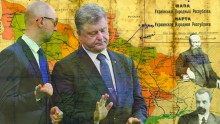Even though Prime Minister Arsenii Yatseniuk did not lose his post after the Cabinet got its dressing down in parliament, certain disheartening (mildly speaking) conclusions and alarming historical analogies are persistently on one’s mind. These analogies are so obvious it doesn’t take a professional historian to see them, and to see the clear symptoms of our national “three hetmans” disease.
Why three hetmans? Back in the 17th century, Ivan Vyhovsky, Martyn Pushkar, and Yakiv Barabash (1658) each tried to prove that he was the number-one patriot, Ukrainian, defender of Eastern Orthodoxy, and Cossack. Their feud opened the door for Alexis of Russia whose troops invaded Ukraine; Ivan Mazepa and his rival, Semen Palii, got into a fight, much to Peter I’s delight; there was little love lost between Symon Petliura and Volodymyr Vynnychenko (one could say that they hated each other’s guts) and in the heat of their struggle lost the Ukrainian National Republic. In fact, the year 1919 that was fatal for the national liberation movement paved the way for the bloody terror of 1932-33. Finally, the “constructive” and “warm” political cooperation between Viktor Yushchenko and Yulia Tymoshenko in 2005-10. Who benefited from this? Of course, our “big brother” Russia and its current leader who is resolved to “bring together” the lands of Rus’ under his reign.
How many times can one repeat a bad mistake? This question addresses our political leadership. Have they forgotten the way they fought to win the throne during the war that began after Russia had invaded Ukraine? Don’t they realize that struggling to become the number-one patriot (or maybe the number-one corruptionist), be it on Hrushevsky St. or on Bankova St., means playing into Putin’s hands, undermining the state of Ukraine behind a flag-waving smoke screen. How many times has this happened in our history? Hrushevsky wrote about this, but they aren’t likely to read his books and learn from them because they have different values and priorities. There are three myths being actively disseminated by the media on their off-the-record payroll.
First, the myth about a technocratic (and apolitical!) Cabinet. Common sense – and I believe Ukrainians have enough of it – says that no government can be apolitical, least of all in time of war. That’s a fact and one shouldn’t play with public opinion that way. The second myth is about the sanctions of the West that will topple the Putin regime, if not this year, then next year for sure, and that then everything will be OK. Untrue – and bona fide experts are saying as much – because imposing sanctions without taking harsh military and political measures is not enough (Bismarck wrote that Russia’s greatest resource was the boundless patience of its people). Besides, the biggest question today is: Time on whose side, Ukraine’s or Putin’s? The fact remains that Ukraine’s failing economy is on a steeper decline than Russia’s. Add here the brainwashing factor.
If the Ukrainian political leadership wants to be scorned and hated by the people (who made so many sacrifices to bring them to power and whom this leadership despises so much that every attempt to make the life of these people a little easier is condemned as populistic while calling for patience, promising economic growth while reiterating that the state purse is empty), then it is on the right track. Then those “upstairs” should keep playing their dog-eat-dog game, except that this would be a losing game for them (the people could live with this) and, abysmally worse so, for Ukraine.







